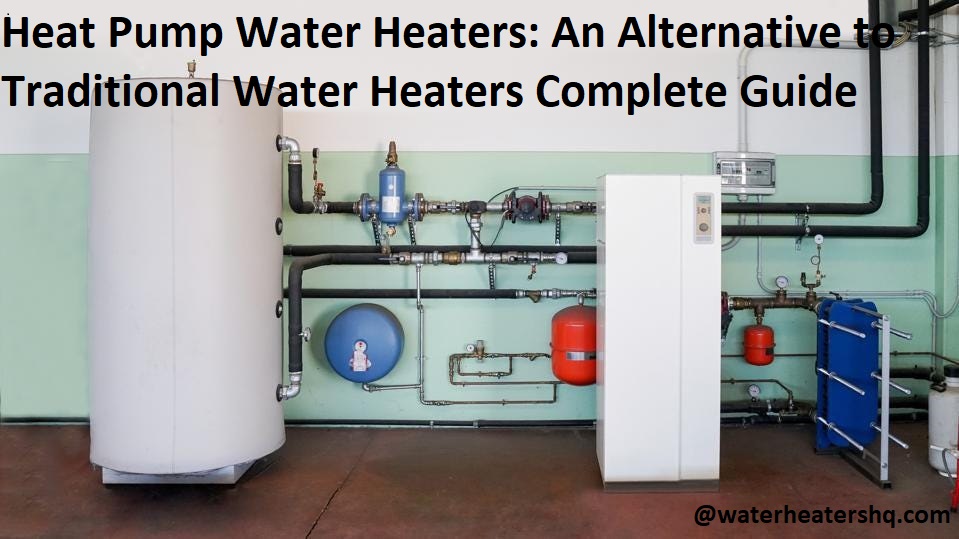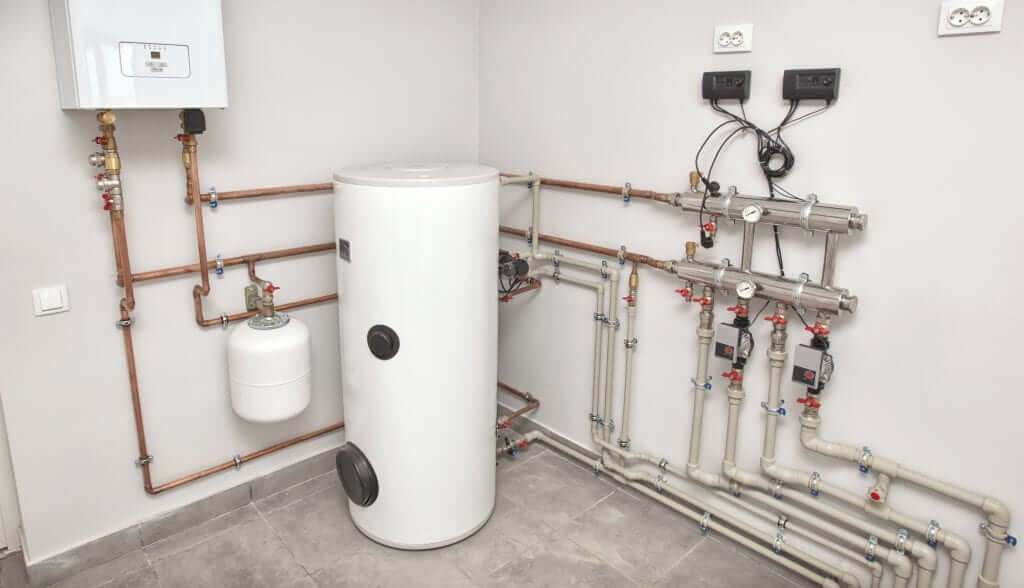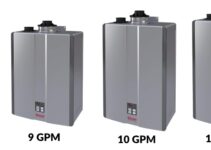Are you concerned about the high cost of heating water in your home? A heat pump water heater could be the perfect solution. You can save money while receiving hot water on demand with this efficient, easy-to-install appliance.
Find out how a heat pump works and how it can benefit you here.
Today, the need to reduce energy usage and costs has become increasingly important. As such, many consumers are turning towards heat pump water heaters as an alternative to traditional storage tank water heaters. Heat pump technology utilizes electricity to run a compressor and evaporator. Heat energy is pulled from the air and transferred into the water stored in a storage tank, providing hot water on demand. The efficiency of this appliance is significantly higher than that of a traditional storage tank water heater, making them an effective way to save energy costs.
This guide provides an overview of the features and benefits of heat pump water heaters, allowing Consumer Reports readers to make an informed decision when it comes time to purchase a new appliance. We will discuss how they work and compare their performance against traditional electric resistance water heaters (ERWH). Additionally, we will discuss install requirements for both types of technologies as well as provide troubleshooting tips for common repairs associated with each model. Finally, you will learn about available tax incentives for purchasing certain eligible models that can help offset some costs associated with installation.
Explanation of what heat pump water heaters are
Heat pump water heaters use a refrigerant-based mechanism to transfer heat from the surrounding air into the tank, allowing them to deliver more energy than electric water heaters typically consume. This process is known as “heat pump technology.”
Instead of using an electrical element to generate and store hot water, these units draw warm air from the environment and use this air to heat and store cold water in an insulated tank. Heat pump water heaters are more efficient than traditional electric models, using up to 60% less energy. This efficiency makes them particularly well-suited for homes located in moderate climates, since they can provide significant savings on utility bills compared to traditional electric units.

Explanation of why they are a good alternative to traditional water heaters
Heat pump water heaters offer a 50-70 percent energy savings compared to traditional electric water heaters. Traditional electric resistance water heaters use electrical coils to produce the heat needed to warm the water. Heat pump water heaters, on the other hand, use an air source or a refrigerant to absorb and transfer the heat necessary to generate hot water. By using existing heat rather than generating more, these models are able to achieve up to four times more efficiency than traditional electric options.
Heat pump water heaters are also often much quieter and take up less space than traditional models due to their vertical design and lack of tank-style storage. The smaller footprint and vertical design also allows for additional installation locations such as crawl spaces, closets, attics and other areas where traditionally-sized units may not fit or function effectively.
This alternative offers additional benefits when it comes to maintenance costs as well as comfort levels within homes or other spaces that utilize this technology. Heat pumps are self-regulating, meaning that you do not need to manually adjust the temperature settings like you do with traditional electric systems. This can eliminate potentially expensive repairs due to accidental thermal shock (when an element fails due the sudden drops in temperature). In addition, these systems provide consistent temperatures in your home throughout the heating season while also providing efficient dehumidification capabilities which add up extra financial savings over time.
How Heat Pump Water Heaters Work
Heat pump water heaters, also referred to as HPWHs, use an electrically powered compressor and an insulated storage tank to heat water from ambient temperatures. Unlike traditional water heaters, which warm the air around them and use it to warm their contents, HPWHs take their heat from the air. This makes them up to three times more efficient than standard models.
A typical HPWH consists of a storage tank that’s kept insulated with layers of insulation material and an evaporator coil, which transfers thermal energy from the surrounding air into the liquid refrigerant that flows through it. When the refrigerant becomes heated, it is then compressed and pushed to a condenser coil where the heat is released into the water in the tank. As this process takes place on a continuous loop, hot water remains available when needed.
In addition to their energy-efficiency benefits, HPWHs also have features such as adjustable temperature settings and built-in timers that help further optimize efficiency. This can result in substantial savings on energy costs over time compared to traditional models.
Explanation of the basic mechanics of heat pump water heaters
Heat pump water heaters use electricity to move heat from one place to another instead of generating heat directly. As a result, they can be two to three times more energy efficient than conventional electric resistance water heaters.
To move the heat, heat pumps work like a refrigerator in reverse. They draw heat from the surrounding air and transfer it into the stored water through a set of coils and refrigerant. During operation, vapors are compressed and circulated through evaporator and condenser coils which remove or reject the latent heat from the area surrounding the unit. This process helps provide consistent hot water while significantly reducing energy costs.
Additionally, since a great deal of its energy is recycled, these units are much more eco-friendly than traditional systems as well.
Explanation of the benefits of using a heat pump water heater
A heat pump water heater is a highly efficient and cost-effective alternative to traditional water heaters. It works by using a compressor and fan to draw in warm air, then using an evaporator coil, to absorb the heat from the air. The heat is then transferred to a heat exchanger, which heats the water before finally distributing it throughout your home or business.
A significant advantage of this type of water heater is that it not only provides hot water on demand, but it also helps to reduce your energy consumption overall.
Heat pump water heaters have many benefits when compared with traditional models. First, they are extremely energy-efficient. Heat pump models operate at up to 50% more efficiency than other types of hot water systems – resulting in lower utility bills every month. Additionally, since these pumps utilize renewable energy sources such as solar or geothermal, their environmental impact can be much lower than that of nonrenewable heating systems – often making them eligible for government rebates and incentives as well.
Another advantage is that they are relatively low maintenance compared with traditional gas or electric models; they require very little attention after installation and feature automated settings for all functions related to temperature control and power usage, so you don’t need to worry about constantly making adjustments yourself. Finally, Heat pumps can be installed indoors or outdoors depending on individual preferences and can generally fit into smaller spaces due to their compact size.
Installation and Maintenance of Heat Pump Water Heaters
Heat pump water heaters require the assistance of a professional for installation and commissioning, as this ensures that the unit is properly installed and operating safely. It is important that only certified professionals perform maintenance and service on your heat pump water heater system for best results. There are several types of maintenance and services that can be done on your heat pump water heater:
- System Checks – these should be performed on a regular basis to ensure that the unit is in good working order. This includes checking temperatures, safety features, operation parameters, fans, and other components.
- Filter Changing – many units use a filter to help reduce condensation and keep the air circulating freely. It is important to regularly change or clean this filter to ensure maximum efficiency.
- Coil Cleaning – Heat pump water heaters use coils to transport heated air over cold air inside the tank or unit itself. As such, it is necessary to routinely clean these coils in order to remove dust or other dirt particles that may build up over time due to normal wear-and-tear of usage in everyday environments.
4 .Replacing Parts – If any of the parts in the system need replacement, such as fans or capacitors, then it is best practice for a certified technician to perform this task correctly so as not void any warranties associated with the unit’s manufacturer
5 .Thermostat Calibration – Heat pumps can have their thermostats adjusted/calibrated in order for optimal efficiency levels when it comes time for usage within a household environment r setting.
Explanation of what is involved in installing a heat pump water heater
Installing a heat pump water heater involves taking certain steps to ensure the system works correctly. The most important step is selecting the right model for your home. The size and type of heat pump water heater you select will depend on factors like your home’s size, climate, water demands, and any government incentives that are available.
Once you’ve selected the correct model, the installation process can vary depending on when installing a new system or replacing an old one. Installation typically includes the following steps:
- Establishing a power supply: Heat pump water heaters will need their own dedicated electrical connection and circuit breaker to provide power to run the equipment and support any additional components such as an air-source exchanged unit or backup heating element.
- Plumbing Connections: All plumbing connections should be done in accordance with local building codes by a qualified professional for proper operation.
- Refrigerant Charge: Proper equipment operation requires exact amount of refrigerant charge specific for each model based on its BTU output rating which should only be done by trained technicians who are certified by an approved Refrigerant Handling Program (RHP).
- Startup & balancing procedures: After all components have been installed and connected, it is important to perform necessary startup procedures that involve checking all control settings or changing them as needed, testing operations, verifying proper performance of safety controls, setting operational temperatures, monitoring gauge/temperature readings while at part-load operations and adjusting parameters appropriately if necessary. Upon completion of these procedures it is also essential to balance water temperature during delivery by activating “temperature balancing” features offered in some models if equipped with that option provided.
Tips for maintenance and upkeep of a heat pump water heater
Adequate maintenance and upkeep of a heat pump water heater is essential for efficient operation as well as to prolong its service life. Regular maintenance not only helps maintain efficient operation but also helps to identify issues early and prevent them from becoming bigger problems. Here are some tips to make sure your heat pump water heater stays in top shape:
- Be aware of the ambient temperature of the room where it’s installed – Heat pumps operate best in environments between 50°F and 105°F, so it’s important to check your home’s temperature regularly and make sure that it’s within the optimal range for efficient operation.
- Clean or replace filters regularly – As with any appliance, buildup of dust, dirt or debris can cause operating issues and reduce efficiency. Make sure to check and clean or replace air filters at least once a year using warm soapy water (and a soft brush if necessary).
- Check ventilation systems – If a heat pump water heater is integrated with a forced-air ventilation system (using an exhaust fan or blower), be sure to ensure that it is in good working order and that there are no obstructions that could hinder air flow around the tank (e.g., furniture). This ensures proper operation and prevents overheating of parts such as wires, coils, fans etc., which can lead to failure of these components over time if not addressed quickly.
- Flush the system yearly – The tank should be flushed periodically (or at least annually) with lukewarm water mixed with vinegar or lemon juice to remove scale buildup and mineral deposits inside the tank, ensuring maximum efficiency when heating water for use in your home or institution building, among other benefits like reducing wear on related parts over time due to reduced stress from sediment build-up in the tank walls etc.

Comparison to traditional water heaters
Water heaters using a heat pump as the primary heating source make up a significant portion of the market in some areas, such as California and Hawaii. Heat pumps are efficient, capable of producing up to two times the amount of hot water with one-fourth the energy usage when compared to a traditional electric water heater. Additionally, heat pumps do not require venting like traditional water heaters, making them more versatile in their placements and eliminating the extra costs associated with gas units.
In terms of cost-effectiveness, for most people living in moderate climates, a standard natural gas or propane water heater is likely the best buy over time because it will produce hot water at a lower cost than an electric model. However, for those living in cold climates or areas where natural gas or propane fuel is not available, an electric heat pump may be more cost-effective over its lifetime because it can provide hot water at lower temperatures and higher efficiencies than an electric-only unit. Additionally, certain tax credits and incentives may make them even more attractive.
Environmental Benefits
One of the most compelling reasons to choose a heat pump water heater is its potential to lower your energy costs significantly and provide rooms with an additional source of warmth in the winter months.
However, the potential environmental benefits of using a heat pump water heater cannot be overlooked. By using a renewable source of energy to heat your water, you can reduce your overall carbon footprint and reduce your contribution to climate change.
Furthermore, the air-source heat pump used in such water heating systems typically produces fewer greenhouse gas emissions than other electric powered counterparts since it utilizes electricity very efficiently.
Finally, this technology is widely supported by many utility companies that actively promote and offer incentives for installing them due to their positive environmental impact.
Explanation of the environmental benefits of using a heat pump water heater
Heat pump water heaters are more energy efficient and environmentally friendly than traditional water heaters. They work by transferring heat from the air around them to the water in the tank. This begs the question: why would an environmentally conscious person choose a heat pump water heater over a traditional one? The answer is simple, because they are much more efficient in their use of energy, which translates into substantial savings on monthly bills.
Additionally, by using energy from the surrounding air to draw warm air in, rather than generating its own through electric coils or burning natural gas, heat pump water heaters reduce greenhouse gas emissions that contribute to climate change. This is especially important for those who live in areas where power plants and industrial complexes emit large amounts of pollutants into the atmosphere every day, since even small reductions can have a big impact on their communities.
Heat pumps also require minimal maintenance over their lifetime due to their few moving parts; this means fewer visits from costly service technicians and fewer hassles when it comes time to replace one’s current system. Furthermore, they can be “switched” to run off electricity instead of natural gas if one wishes to take advantage of electricity incentives offered by some providers and utility companies (e.g., tiered rates). All these features combined make these types of water heating solutions extremely attractive for most households looking for ways to reduce their impact on the environment and save money on energy costs.
Comparison to traditional water heaters
Heat pumps water heaters typically use about half the energy of a traditional electric resistance water heater, saving energy and money in your home. The efficiency of heat pump water heaters depends on the location of their installation and the climate, but studies indicate that home owners can save 20 to 50 percent annually compared with a standard electric-resistance heater. These savings come from the fact that it takes less energy to move heat than to generate it through electricity. Heat pumps also transfer more heat into your hot water tank, so they are capable of heating your tank more quickly than a standard electric resistance water heater.
When comparing these appliances, it’s important to note that not all models are created equal. Some models are more efficient than others and will cost less initially as well as over time to operate compared with traditional electric resistance counterparts. Look for an Energy Star label when shopping for a new water heater to ensure you’re getting the most efficient product available on the market today!

Conclusion
The decision of whether to use a heat pump water heater or a traditional tank-based unit must be made on an individual basis. It is important to take into account the area climate, amount of available space, the cost of energy, and other factors. In most cases, a heat pump water heater will be more efficient and more economical than conventional tank-based units.
Heat pumps can also reduce emissions and help conserve limited natural resources. Therefore, they can provide an environmentally friendly alternative to traditional water heating solutions.
FAQ’S
How is a heat pump water heater different from a traditional electric water heater?
A heat pump water heater uses electricity to move heat from the air or ground to heat the water, whereas a traditional electric water heater directly heats the water using heating elements.
Can a heat pump replace a hot water heater?
Yes, a heat pump can replace a traditional hot water heater, but it may require some modifications to the plumbing and electrical systems.
What are alternatives to a traditional water heater?
Alternatives to a traditional water heater include tankless water heaters, solar water heaters, and heat pump water heaters.
What is the disadvantage of heat pump water heater?
The main disadvantage of a heat pump water heater is that it may have a higher upfront cost compared to a traditional water heater.
What is the advantage of heat pump water heater?
The main advantage of a heat pump water heater is that it is more energy efficient than a traditional water heater, which can result in lower energy bills over time.
Is heat pump better than geyser?
A heat pump is generally considered more energy efficient than a geyser, which can result in lower energy bills. However, the best option depends on the specific needs and circumstances of the household.
Does heat pump water heater use more electricity?
No, a heat pump water heater uses less electricity than a traditional water heater because it moves heat from the air or ground instead of directly heating the water.
Is a hot water heat pump better than a hot water cylinder?
A hot water heat pump can be more energy efficient than a hot water cylinder, but the best option depends on the specific needs and circumstances of the household.
What is the difference between a heat pump and heater?
A heat pump moves heat from one location to another, while a heater directly generates heat to warm up a space or material.
Are heat pump water heaters noisy?
Heat pump water heaters can produce some noise when operating, but they are generally quieter than traditional water heaters with heating elements.
See Also:
- Best power vent water heater
- Best propane tankless water heater
- Best solar water heater
- Best tankless water heater
- Best under sink water heater


